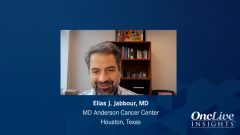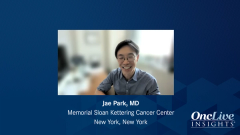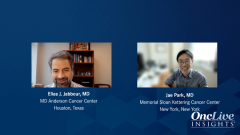
Relapsed/Refractory B-Cell ALL: Future Perspectives
Closing thoughts on advances and future perspectives in the treatment of patients with relapsed/refractory B-cell acute lymphoblastic leukemia.
Episodes in this series

Elias J. Jabbour, MD: Before we conclude, I’d like to summarize my thoughts as well. Progress has been amazing in ALL [acute lymphoblastic leukemia] across every subset. We have better known biology and better therapy available for Burkitt [leukemia], Ph [Philadelphia chromosome]-positive, and pre-B and T cells. Progress is being made. With the treatments available, we’re moving toward less chemotherapy and a more targeted approach, or a combination. I’d like to highlight to our audience that there’s no one treatment. We have several options, and I don’t think they’re competing options. Whether inotuzumab, blinatumomab, or CAR [chimeric antigen receptor] T cells, they’re all complementary to maybe use in combination or sequential fashion to improve the outcome.
In the future, we’ll use less chemotherapy, shortened chemotherapy, and have new drugs that we haven’t explored today. We have the BCL2/BCL-XL inhibitor, bispecifics, tetraspecific, quadrispecific, and trispecific. So many things are happening. We have subcutaneous blinatumomab, new antibodies, and new CAR T cells, the allogeneic CAR T cells. We have autologous CAR T cells, CD19 and CD22, which Dr Park talked about, NK [natural killer] cells, and others.
Finally, one of the most critical things in ALL is MRD [minimal residual disease]. MRD as early as possible is the best [for treatment] because I truly believe assessing for MRD will tailor our therapy for the future. As Dr Park said, I believe that one day CAR T will replace allotransplant for high-risk patients in the front line, and a consolidation approach in the relapsed setting as well.
Thank you, Dr Park, for this rich and informative discussion. Before we conclude, I’d like to get your closing thoughts on unmet needs and future perspective on the treatment of adult patients with relapsed/refractory ALL.
Jae Park, MD: That’s a great conclusion, so I don’t have much to add. The unmet need is that the relapsed patients still do poorly despite the best therapies that we have, which is another reason to emphasize MRD and early interventions. That’s something we’re trying to do. At the first salvage, the outcome isn’t as good as the frontline setting. We want to prevent the relapse from the very first time. In order to do that, we need a better therapy, better use of such agents, and we want to intervene early.
The one way to do so, to reiterate our thoughts from earlier, is referring early for these patients, before the relapse happens. It takes time to plan inotuzumab, blinatumomab, and CAR T cells, and intervening or referring at the right time so that we can choose a right therapy and plan the CAR T-cell collection and so forth can make a big difference in the outcome of those patients. We have a window to modify their disease to improve the outcome of the CAR T cells, so that’s important.
To our listeners, if you have a patient with ALL, call the nearby larger academic centers. All of us will be happy to chime in and give our thoughts and opinions and see these patients, because we all realize that there’s a finite window of time to make the biggest difference for our patients. Referring early is the key message that I try to deliver every time that we have these types of conversations. And in the relapsed setting, hopefully we can reduce high-intensity therapy and move toward more low-intensity immunotherapies with a better quality of life, and then reduce the long duration of our therapy. ALL therapy in general is still 3 years for patients in the frontline setting. With the better tools that we have, we should be able to shorten that. Hopefully we can accomplish that in our lifetime, too. That would be the big goal that we can accomplish for our patients.
Elias J. Jabbour, MD: Thank you again. To our viewing audience, we hope you found this OncLive® Insights® discussion to be useful and valuable in the treatment of your adult patients with relapsed/refractory ALL. Thank you. Stay safe. Happy Holidays.
Transcript edited for clarity.





































